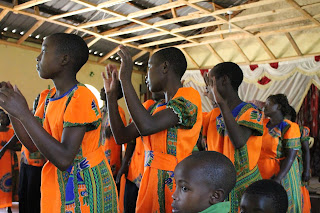righteousness
and
obedience
In particular, Joseph and Mary exhibited these qualities. And we have much to learn from them that can and should be applied all year long. As we enter into a new year, I'm encouraged to continue loving and pursuing a righteous and obedient life.
"Joseph her husband was a righteous man..."
Scripture has very little to say about Joseph, but we know this much: he was a righteous man. It's one of the first things we learn about him. In Matthew 1:18, we learn that he and Mary were pledged to be married to one another. In the next verse we read plainly: "Joseph her husband was a righteous man..." The Greek word that's translated into English as "righteous" is δίκαιος (pronounced dē'-kī-os). According to www.blueletterbible.org, it means exactly how it was translated: righteous. To take it further, it describes someone who observes divine and human laws. To take it further still, it describes someone "who is such as he ought to be."
Joseph was a righteous man. He was such as he ought to be.
After letting that sink in, I decided this will be a new prayer of mine: "Lord, may I be as I ought to be."
Meaning, may I be as He desires me to be. May I bear His image with honor and humbleness. May I see people and treat people like Jesus does. May I follow and serve Him no matter the cost. May I listen to Him and choose obedience to Christ every day. May I bear fruit for His Kingdom because I am being as I ought to be.
I am humbled by Joseph's righteousness, not because it existed in a vacuum but because it led to faithful obedience. Matthew 1:19 actually begins, "Because Joseph her husband was a righteous man..." This is the verse that tells what Joseph did upon hearing that Mary was pregnant, and not by him. According to Mosaic Law, he could have had her publicly judged and stoned. Instead, because he was a righteous man, he decided to divorce her quietly and spare her the experience of public shame. This says a lot about Joseph's character.
But that's not all.
After he decided that a quiet divorce was the better course of action, an angel visited Joseph in a dream and told him to marry Mary anyway. The angel explained that "what is conceived in her is from the Holy Spirit" and the baby - to be named Jesus - would save His people from their sins.
Then, "When Joseph woke up, he did what the angel of the Lord had commanded him and took Mary home as his wife" (Matthew 1:24, emphasis mine).
Joseph did as he was told. Even though it made little sense. Even though it would invite chastisement from those around them. Even though it required reorienting his perception of the situation. Even though it meant working through the confusing and painful emotions of betrayal and distrust so they could be replaced with understanding and love. Even though it meant agreeing to a different life than he'd signed up for.
Despite all that came with it, Joseph did as he was told.
Because of all that came with it, Joseph did as he was told.
He did as he was told because he was being as he ought to be.
I'm convinced that righteousness begets obedience. Joseph chose to obey the command of the Lord because he was righteous. Later, when an angel again appeared to Joseph in a dream and gave a command, he obeyed. Right away. He didn't even wait until morning, but "got up, took the child and his mother during the night and left for Egypt" (Matthew 2:14). Joseph's righteous character led to obedience. His love for God led to service of the King.
And I'm sure that's why he was chosen to be the husband of Mary and the earthly father of Jesus.
Mary would need a righteous man to stand by her and withstand the judgments from those around them. She would need someone who could (and did) hear the Lord and believe her story. She would need someone willing to parent a child not entirely his own.
And Jesus would need a righteous man to love and care for His human self. He would need someone who could (and did) hear the Lord and rush to protect his family by escaping in the night. He would need someone willing to cross borders and live cross-culturally for an uncertain amount of time in order to keep his child safe.
The Christmas story would not be the same without Joseph. It would not be the same without his righteousness.
"I am the Lord's servant. May it be to me as you have said."
We know a bit more about Mary than we do about Joseph. What continues to astound me is her humble character. She knew her place in the universe. I don't mean that she was chosen to be the mother of the Savior, but that she was committed to being the Lord's servant. Period.
Her response to the angel Gabriel's announcement that she would give birth to the Son of the Most High displays her heart: "May it be to me as you have said" (Luke 1:38). Someone overwhelming and frightening shows up unexpectedly (hence the need to say "Do not be afraid, Mary") and says something kinda crazy (you're gonna have a baby even though you're a virgin - and he'll be the Savior of the world, by the way), and Mary essentially says, "Yeah, okay. Whatever you say is cool with me."
She was obedient. Even though it meant her reputation would be maligned. Even though it meant her relationship with her betrothed would be deeply affected. Even though it meant a sword would pierce her own soul too (Luke 2:35). Even though it meant agreeing to a different life than she'd signed up for.
Despite all that came with it, Mary said yes.
Because of all that came with it, Mary said yes.
Mary said yes because she was obedient.
And I think she was obedient because first she was righteous. The two tend to go hand in hand. Righteousness begets obedience.
Mary and Joseph, a righteous and obedient couple, suffered much for their decisions to follow and serve God how He asked them to. But they also benefited much. They experienced miracles. They spoke with angels face to face. They gained a personal understanding of how the Holy Spirit can work through humanity. They witnessed firsthand how joy can infect people (think of Zechariah and Elizabeth, the shepherds, Simeon, and Anna). They were literally gifted with expensive and lavish presents.
But more than anything, they were blessed with participating in God's good plan for the world. And "Mary treasured up all these things and pondered them in her heart" (Luke 2:19). "The child's father and mother marveled at what was said about [Jesus]" (Luke 2:33).
We recently had a long talk with some good friends about a decision they're making that has already raised questions from others. The decision is a good one, a godly one, and they feel confirmed in moving forward after spending many months in prayer about it. But it can be hard on the heart when others don't share an understanding of what God is asking, or when others outright question a decision being made. Our encouragement to them was this: be obedient. There is no greater choice to be made than obedience to Christ. No matter the cost. No matter what people think or say.
We also encouraged our friends by reminding them they're not alone in being questioned for making a counter-cultural decision that will affect their whole life. We've gained some experience in that regard. We've had people question our choice to do missions. To live overseas. To take our children with us. To give up a doctor's salary. To be financially dependent on others. To not settle down somewhere. To choose a perceived horrible life.
All of this has been said of us, and often directly to us.
And sometimes it's hard to hear. But always it's a reminder that no matter what people say or think - shoot, no matter what WE say or think sometimes - we are choosing a path of obedience. And I hope that's because we are walking in righteousness.
So as we enter a new year, our prayer is that we would be as we ought to be, like Joseph. And may our response to God's leading be the same as Mary's: "May it be to me as you have said."




































































